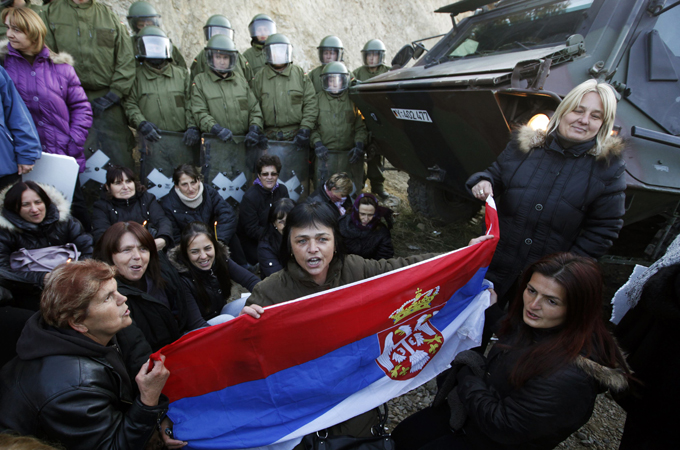Serbia and Kosovo reach border deal
Countries agree to jointly operate border posts after Serbs erect road blocks and injure 30 NATO troops.

 |
| NATO troops have used tear gas and armoured vehicles to disperse protests along the disputed border[REUTERS] |
Serbia and Kosovo have struck a key deal on the controversial issue of border management, European Union mediators said after the third consecutive day of negotiations in Brussels.
In a statement late on Friday, the EU said Serbia and Kosovo agreed to joint management of their border points, but indicated that the deal “will be gradually implemented as soon as practically possible”.
The bloc also added that the EU’s law and justice mission in Kosovo, EULEX, “will be present in line with its mandate”.
The EU announcement of a deal followed three days of long talks into the late hours as Serbia came under strong pressure from EU nations and NATO to take a proactive role in stemming violence on the border.
Belgrade and Pristina also agreed to fully implement a previous deal on free movement.
“The expectation is that there will be full implementation of the freedom of movement agreement as of 26 December 2011, resulting in free travel for everyone,” the EU said.
Bowing to pressure
Serbia had been under intense pressure to compromise, as the EU has set progress in the talks and improved relations with Kosovo as a crucial condition to recognizing the country as a candidate for membership in the bloc.
But it remains to be seen whether the progress registered on Friday will be enough to secure a positive decision on the matter from an EU summit on December 9. EU affairs ministers are to hold a preparatory debate on Monday.
Serbia’s standing in EU circles was damaged by incidents on Monday, in which 30 NATO troops were injured by ethnic Serbs. The troops were attacked as they dismantled roadblocks that had been put up to prevent Kosovo officials from taking control of border points with Serbia.
Serbian President Boris Tadic condemned the violence on Wednesday, but Germany and Austria – whose own soldiers were targeted by the attacks – have suggested that he had not done enough to prevent it.
In a speech to parliament on Friday, German Chancellor Angela Merkel said Serbia “stands accused of contributing in recent days to an atmosphere where German peacekeepers in the north of Kosovo have been attacked with guns and wounded. I say that is not acceptable.”